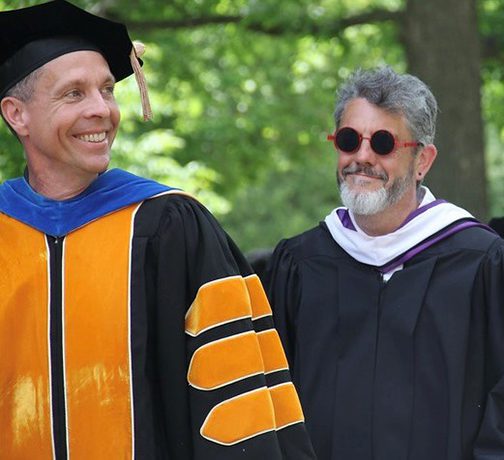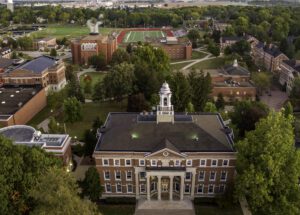A pair of faculty members who were recently promoted to full professor shared Monmouth College’s Hatch Award for Scholarship and Creative Work this year.
Classics professor Bob Simmons and English professor David Wright were the honorees.
“My scholarly efforts model for my students what I typically ask them to do in my classes, which is to use their analytical skills to work from existing material to create new knowledge,” said Simmons. “What they create is new, based on their previous knowledge, while what I try to create is new, based on the work of the worldwide community of scholars.”
To that end, Simmons authored Demagogues, Power, and Friendship in Classical Athens: Leaders as Friends in Aristophanes, Euripides, and Xenophon, which was published in 2023. The book examines ways in which a demagogic leadership style based on personal connection became ingrained in ancient Greece, drawing on close study of several genres of literature of the late 5th and early-to-mid 4th centuries BCE.
Simmons not only models scholarly work for students but solicits their help, as well.
“Many classics student-workers have made many meaningful contributions to my publications,” he said. “Those students see firsthand the work and the process that go into adding new insights and perspectives to the established body of scholarly knowledge.”
“I witnessed Bob’s completion of this work, in part, during two winters of middle-school basketball games as he sat in the bleachers, cheered for the ICS Trojans, and balanced his ubiquitous laptop on his knees,” wrote his nominator for the award. “Bob demonstrates a doggedness that, in the long run, not only benefits his discipline but keeps the life of the mind vibrant on this campus. As Bob’s fortunate colleagues, we get to witness regularly an impressive instantiation of a true scholar-teacher’s calling lived out in front of us – what it looks like to not only pursue knowledge but to discover and create it with generations of students.”
Wright-ing at Monmouth
For the past decade, Wright has brought talented authors to campus through the Writing @ Monmouth series he started, and he’s also worked with scores of Monmouth students to find their voices.
But through it all, Wright is a talented writer himself.
“David’s production of poetry since he began at Monmouth in 2013 has been vast,” wrote his nominator. “He has just continued to write, keeping at the process that leads to publication, providing a model that his students and peers can follow.”
Many of his efforts have produced award-winning work. In 2023, Wright’s The Darker Roads was a Midwest Writing Center Chapbook Contest finalist. Several individual poems, too, have placed well in contests, including three since 2020, and five of his poems have been chosen to appear in anthologies and textbooks during that time. One of his works was shared last year on the National Public Radio afternoon news program All Things Considered.
His most recent poetry collection, Kyrie for the Gut: New & Selected Poems, has been accepted for publication by Cascadia and is slated for release later this year or in 2025.
“In my office, when I am surrounded or overwhelmed by books and stacks of papers to grade, I often open a blank document and begin to type,” said Wright. “What matters is the developed impulse to attend to the practice of writing, writing what I can and need to write. I want students, if they desire, to learn something like this. And how will they learn that if they never see it happen?”
Something else in common
In addition to sharing the Hatch Award, Simmons and Wright also share a scholarly distinction, working together – along with faculty colleagues Valerie Deisinger and Anne Mamary – on a grant proposal that was accepted by the National Endowment for the Humanities. The first event in the resulting three-year project, titled “Re-situating the Humanities in Place-Based Learning,” was held last month when a history professor from Rutgers University gave a talk on campus.
“Although writing poems has taken most of my intellectual and artistic energies over the past number of years, the NEH grant with my colleagues gives me a chance to return to my scholarly work on how writers engage with communities and places that shape us,” said Wright. “And I get to involve students in that important project.”
Earlier in the year, Simmons was a major part of another NEH-funded project, teaming with Louisiana middle school classics teacher Nathalie Roy on the two-week summer institute “The Ancient Olympics and Daily Life in Ancient Olympia: A Hands-On History” that was held on Monmouth’s campus.
***Courtesy of Barry McNamara, Monmouth College***








